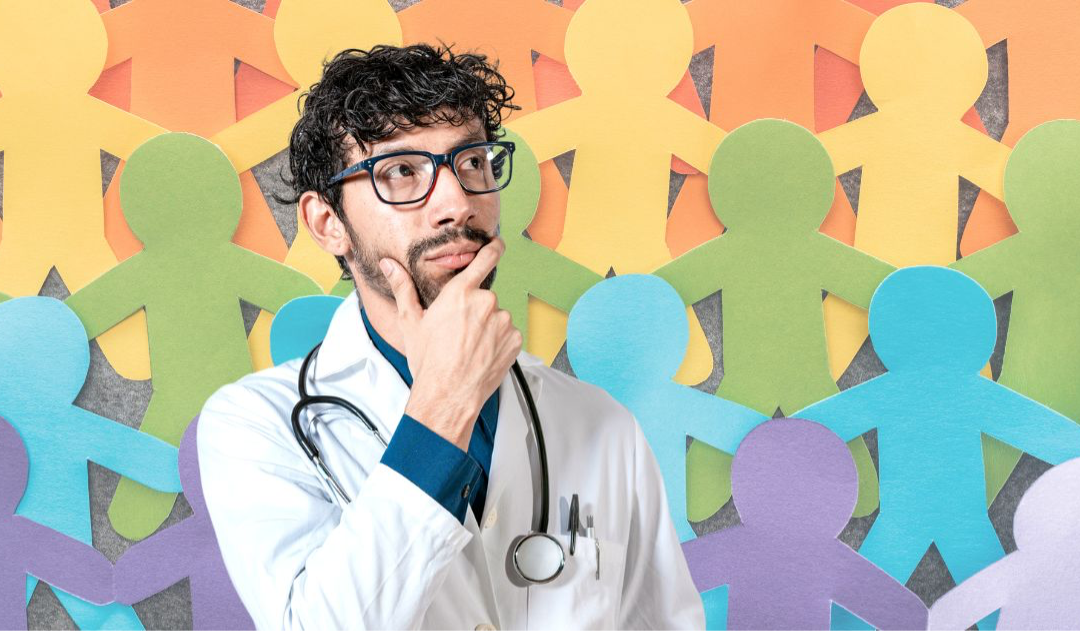Gender-Affirming care saves lives and curriculums are still playing catch-up. Studies of health care professional education and training programs reveal significant gaps in the exposure and education regarding LGBTQ+ patients. Addressing these gaps is essential to ensure comprehensive and competent care for everyone.
Unraveling the Impact of Limited LGBTQ+ Exposure
All physicians, irrespective of their specialization, need an adequate number of patient interactions to develop expertise and ensure effective patient care. However, in the realm of LGBTQ health, there seems to be a concerning deficiency.
One study targeting U.S. dermatology residents revealed that many interacted with fewer than 20 LGBT patients per year and spent less than 75 minutes annually on LGBT-specific education. This lack of exposure extends beyond dermatology. Given the higher prevalence of mental health conditions within the LGBTQ+ community, psychiatrists must be adept in catering to these patients. Yet, many psychiatry residents have indicated feeling inadequately prepared clinically, even if they possess a positive attitudinal awareness toward the LGBTQ+ community.
Untangling the Web of Challenges
Limited exposure isn’t solely a result of oversight. Geographic location, whether due to being less populated or more conservative, can significantly hinder a provider’s ability to gain intentional experience in patient care with openly LGBTQ+ patients.
Some providers might also fear offending their transgender or gender-diverse patients or making mistakes, especially if they aren’t familiar with the appropriate terminology or best practices. This fear can lead to avoidance, resulting in increased stigmatization and discrimination.
Moreover, providers may face financial constraints, as attending specialized training or conferences might come with significant costs. Coupled with this is the challenge of time. With packed schedules, finding opportunities to engage in extended training sessions, community events, or research can be daunting. And even if both time and funds are available, the lack of easily accessible and relevant training resources tailored to LGBTQ+ care can pose yet another barrier.
Charting a Course Towards Inclusive Healthcare
How then, in the face of these challenges, can healthcare providers foster a more inclusive environment? Studies on student pharmacists present a potential roadmap. Findings indicate that a mix of increased patient exposure and targeted education considerably enhances their readiness and overall cultural competency. For example, student pharmacists who interacted with 25 or more LGBT patients and dedicated a minimum of 10 hours to LGBTQ-centric education reported higher levels of competency.
Additionally, forging connections with LGBTQ+ organizations can offer insights into the lived experiences of this community. Community outreach is another aspect of this multifaceted approach, where providers not only learn but also give back, reinforcing the relationship between healthcare providers and the communities they serve.
Therefore, healthcare demands a tailored approach to cater to the varied fabric of society. It’s vital that each person, no matter their sexual orientation or gender identity, benefits from holistic, compassionate, and informed care. The research discussed in this article underscores the urgent need to bridge the gaps in LGBTQ+ patient exposure and education. Facing these hurdles head-on and finding effective solutions can guide healthcare providers toward a future rich in inclusivity and understanding.
Are you facing challenges in providing intentional LGBTQ+ patient exposure? Transition from awareness to action with Simclusive. Engage in 1-on-1 simulations with trained standardized patients (SPs) from diverse backgrounds and amplify your cultural competence. Our platform offers a hands-on approach to understanding and addressing the unique needs of the LGBTQ+ community. Click here to learn more about our service.
References:
- Nowaskie, Dustin Z. “A national survey of U.S. psychiatry residents’ LGBT cultural competency: The importance of LGBT patient exposure and formal education.” Journal of Gay & Lesbian Mental Health, vol. 24, no. 4, 2020, pp. 375-391.
- Nowaskie, Dustin Z., and Anuj U. Patel. “LGBT cultural competency, patient exposure, and curricular education among student pharmacists.” Journal of the American Pharmacists Association, vol. 61, no. 4, 2021, pp. 462-469.
- Nowaskie, Dustin Z., et al. “The current state of lesbian, gay, bisexual, and transgender cultural competency among U.S. dermatology residents.” International Journal of Women’s Dermatology, vol. 8, no. 3, 2022, e030.

